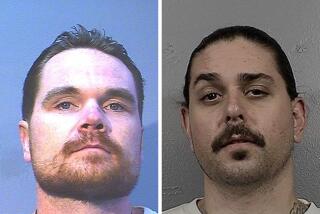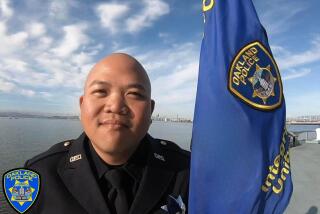Judge Signs Order Setting Killer’s Date for Execution : Crime: Kevin Cooper was convicted six years ago of hacking and stabbing to death four people in Chino Hills.
- Share via
SAN DIEGO — Six years after a prison escapee was convicted of stabbing and hacking to death three members of a Chino Hills family and their 11-year-old neighbor, a judge on Monday signed the man’s death warrant.
San Diego County Superior Court Judge Jesus Rodriguez ordered Kevin Cooper to be put to death on Oct. 25, despite protests from one of Cooper’s attorneys, David Negus, who said that because upcoming appeals are likely to delay the execution, the signing of the warrant had “no practical effect except to terrorize” Cooper.
Rodriguez responded, “I think everybody here is sorry that Mr. Cooper is inconvenienced. However, the four bodies in a cemetery in San Bernardino County were inconvenienced also.”
A few hours later, Cooper’s lawyers began what they predict will be a five-year appeal process, filing a motion with the state Supreme Court to vacate the execution date until Cooper’s case can be considered by the U.S. Supreme Court.
Cooper, 33, was convicted in a trial that was held here because of extensive pretrial publicity in San Bernardino County. He has been on Death Row at San Quentin since 1985, when a jury recommended the death penalty for what became known as the Chino Hills Massacre.
This May, the California Supreme Court upheld Cooper’s death sentence, rejecting his bid for a new trial.
Deputy State Atty. Gen. Frederick R. Millar Jr., who is supervising Cooper’s case, said that while he could not estimate how long Cooper’s appeals will take, he expects a delay.
“This is an initial execution date. He is starting the process that (Robert Alton) Harris has been in for a period of many years. This is the first step in the process,” Millar said, referring to the convicted murderer whose execution was blocked last year. Harris would have been the first person executed in California in 23 years.
The Chino Hills murders occurred in June, 1983, two days after Cooper escaped from the California Institution for Men at Chino. Wanted by authorities in Pennsylvania for escaping a mental institution, rape, kidnaping and robbery, he had mistakenly been placed in the prison’s minimum-security wing after he was convicted of burglary in Los Angeles.
On June 5, 1983, the bodies of Doug and Peg Ryan, both 41, their daughter, Jessica, 10, and Christopher Hughes, 11, were discovered in the Ryans’ Chino Hills home. The victims had been hacked and stabbed with a hatchet, knife and ice pick, and authorities counted 140 separate wounds.
The Ryans’ son, Joshua, then 8, survived a slashed throat and blows to the head. He has since been adopted by his maternal grandmother.
Cooper, the object of a wide manhunt, fled to Mexico and signed on as a deckhand aboard a 32-foot sailboat. He was captured on board the boat July 30, 1983, about 20 miles south of Santa Barbara.
Throughout his trial, Cooper insisted he was innocent. Prosecutors displayed graphic photographs of the victims’ bodies and told the jury not to be fooled by “lies” Cooper told when he testified on his own behalf.
Almost 800 pieces of evidence and 141 witnesses were introduced by both sides during the trial, which so inflamed spectators that the judge had to admonish the jury to disregard “Die Cooper!” and “Kevin Cooper must be hanged” graffiti outside the courtroom.
In San Quentin, Cooper has taken up painting. Prison rules permit him to sell his portraits of Magic Johnson, Michael Jackson and other celebrities in the public gift shop just outside San Quentin’s main gate.
More to Read
Sign up for Essential California
The most important California stories and recommendations in your inbox every morning.
You may occasionally receive promotional content from the Los Angeles Times.










